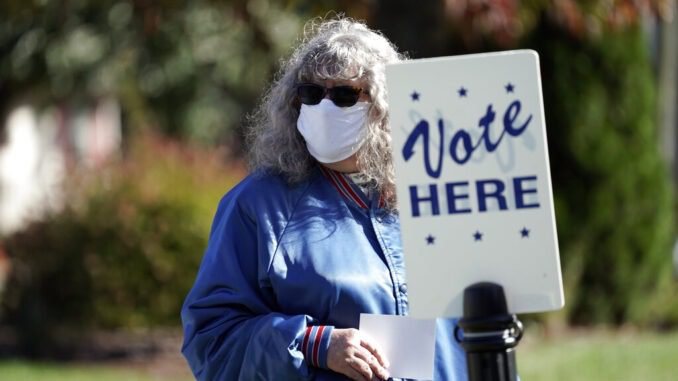
RALEIGH — North Carolina’s latest law requiring photo identification to cast ballots went on trial on Monday, with left-leaning attorneys challenging the mandate by arguing it still disproportionately prevents black residents from carrying out their constitutional right.
A panel of three state Superior Court judges began hearing evidence in the lawsuitfiled to overturn a December 2018 law that filled in the details of how a voter ID constitutional amendment approved in a statewide referendum several weeks before would be implemented.
A federal appeals court struck down in 2016 a voter ID mandate and other portions of a 2013 voting law approved by the General Assembly, declaring these voting restrictions were approved with intentional racial discrimination in mind. That was before the mandate was carried out briefly during the 2016 primary. Enforcement of the 2018 ID requirement upon voters has been blocked so far.
Lawmakers in the Republican-controlled legislature said the new law isn’t racially suspect, pointing out they expanded the types of qualifying IDs and made it easier for registered voters without IDs to have their votes counted.
The evidence shows the new law, rushed for passage so Republicans could override Democratic Gov. Roy Cooper’s veto before their power waned during the next legislative session, suffers from the same racial taint and faults as the previous law, said Allison Riggs, a lawyer for the voters who sued.
The judges should understand while “black voters may be able to jump through additional hurdles to be able to get an ID or to have a provisional ballot that’s counted (that) doesn’t negate the disparate impact,” Riggs said in opening arguments. By the close of the trial, she told them, “you’ll conclude that North Carolina once again enacted an unconstitutional law, a voter ID law designed to keep black voters from the ballot box.”
GOP legislative leaders have countered that the final measure was approved with Democratic support, and that one chief bill sponsor was an African American senator. Legislators also have made various changes to address the concerns mentioned in court rulings and suggested by Democrats, including adding college, government agency and public assistance IDs to the list of qualifying identification cards.
“A racially motivated legislature would not have done any of these things, let alone all of them,” said David Thompson, a lawyer representing House Speaker Tim Moore, Senate leader Phil Berger and other legislative defendants. “It is a state-of-the-art voter ID law that both seeks to secure elections and to guarantee access to all registered voters.”
The State Board of Elections and the state also are defendants in the trial, which is expected to last at least two weeks. Any majority rulings from Judges Nathaniel Poovey, Michael O’Foghludha and Vince Rozier will assuredly be appealed to the state Supreme Court. Two other lawsuits — one each in federal and state courts — targeting the voter ID law also are pending, raising questions whether there would be time to carry it out for the 2022 elections if ultimately upheld.
Emory University professor Carol Anderson took the stand later Monday to describe what she considers links between North Carolina’s voter ID laws and the state’s history of racially tinged voting restrictions.
During opening arguments, Thompson acknowledged what he called the state’s shameful past of voting discrimination, “but it is well-established that past discrimination cannot, in the manner of original sin, condemn governmental action that is not itself unlawful.” He pointed to voter ID laws that have been upheld in other Southern states as proof.
In comments following the first day of the trial, Berger said, “The most impactful part of the day came when the anti-voter ID ‘expert witness’ that the plaintiffs called admitted she didn’t even read the bill and didn’t know that an African American Democrat sponsored the bill, or that Republicans accepted multiple amendments offered by the Democrats.”



